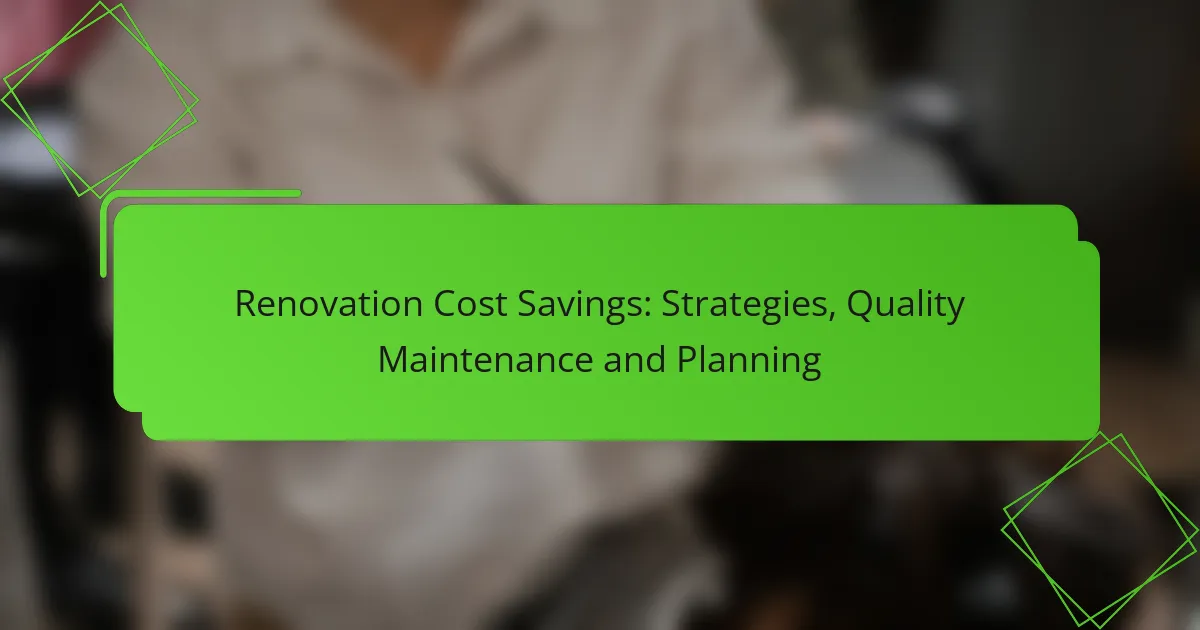Budgeting for home renovation is a crucial step that requires careful planning and prioritization of expenses. By understanding your financial limits and utilizing effective tools, such as budgeting apps and templates, you can track costs and ensure your project stays within budget. Accurate cost estimation, based on materials and labor, will help you create a realistic financial plan tailored to your renovation goals.

What are effective budgeting strategies for home renovation in Ireland?
Effective budgeting strategies for home renovation in Ireland involve careful planning and prioritization of expenses. By understanding your financial limits and the costs associated with renovations, you can allocate your resources wisely and avoid overspending.
Prioritizing essential renovations
Identifying essential renovations is crucial to staying within budget. Focus on improvements that enhance safety, functionality, or energy efficiency, such as upgrading electrical systems or fixing leaks. These priorities should align with your long-term goals for the property.
Consider creating a list of renovations ranked by necessity. This helps in making informed decisions about where to allocate funds first. For instance, if your roof needs repairs, it should take precedence over cosmetic updates like painting.
Using the 70/20/10 rule
The 70/20/10 rule is a budgeting framework that can guide your renovation spending. Allocate 70% of your budget to essential renovations, 20% to upgrades that enhance value, and 10% for unexpected costs. This approach helps maintain a balanced financial plan.
For example, if your total renovation budget is €30,000, you would spend about €21,000 on essential work, €6,000 on value-adding improvements, and set aside €3,000 for contingencies. This structure can prevent financial strain during the renovation process.
Setting a contingency fund
A contingency fund is essential for managing unexpected expenses that arise during renovations. Aim to set aside at least 10-15% of your total budget for unforeseen costs, such as structural issues or delays. This buffer can help you avoid financial stress.
When planning your renovation, include this contingency in your overall budget from the start. For instance, if your renovation budget is €40,000, allocate €4,000 to €6,000 for contingencies. This proactive measure ensures you can handle surprises without derailing your project.

What tools can help manage a home renovation budget?
Several tools can effectively assist in managing a home renovation budget, including specialized apps, templates, and project management software. These resources help track expenses, plan budgets, and ensure that projects stay within financial limits.
Home renovation budgeting apps
Home renovation budgeting apps are designed to simplify financial tracking during your project. Popular options include HomeZada, Houzz, and Mint, which allow users to input expenses, set budget limits, and monitor spending in real-time.
When choosing an app, consider features such as cost estimation, invoice management, and integration with bank accounts. Many apps offer free versions, while premium features may require a subscription fee ranging from $5 to $20 per month.
Excel budgeting templates
Excel budgeting templates provide a customizable way to manage renovation costs. You can find numerous free templates online that allow you to input your budget, track expenses, and calculate variances easily.
Using Excel gives you flexibility in organizing your budget according to specific categories, such as materials, labor, and permits. Ensure you regularly update the template to reflect actual spending and avoid overspending.
Project management software
Project management software like Trello, Asana, or Microsoft Project can help you oversee the entire renovation process while keeping budget constraints in mind. These tools allow you to create tasks, set deadlines, and assign responsibilities, all while tracking costs associated with each task.
When selecting project management software, look for features that enable budget tracking and reporting. Many platforms offer free trials, so you can assess their suitability for your renovation before committing to a subscription, which may range from $10 to $50 per month depending on the features you need.

How to estimate costs for home renovation projects?
Estimating costs for home renovation projects involves gathering data on materials, labor, and other expenses to create a realistic budget. Start by considering the scope of the project and the quality of finishes desired, as these factors significantly influence overall costs.
Researching average costs in Ireland
To effectively estimate renovation costs in Ireland, begin by researching average prices for common projects such as kitchen remodels, bathroom upgrades, or extensions. Websites like the Society of Chartered Surveyors Ireland (SCSI) provide valuable insights into typical costs per square meter for various renovations.
For instance, a kitchen renovation might range from €10,000 to €30,000 depending on the materials and appliances chosen. Understanding these averages helps set realistic expectations and informs your budget planning.
Consulting with local contractors
Engaging with local contractors is crucial for obtaining accurate cost estimates tailored to your specific renovation needs. Schedule consultations with multiple contractors to gather quotes and discuss your project in detail.
During these consultations, ask for itemized estimates that break down labor, materials, and any additional fees. This transparency allows for better comparison and helps identify any potential hidden costs.
Using online cost calculators
Online cost calculators can be a useful tool for estimating renovation expenses quickly. Many websites offer calculators that allow you to input project specifics, such as room size and desired materials, to generate an estimated budget.
While these tools provide a good starting point, remember that they may not account for local labor rates or unique project requirements. Always cross-reference calculator results with quotes from local contractors for a more accurate budget.

What are common budgeting mistakes to avoid?
Common budgeting mistakes in home renovation can lead to overspending and project delays. Awareness of these pitfalls helps ensure a smoother financial process and successful completion of your renovation.
Underestimating labor costs
Labor costs can significantly impact your renovation budget, often accounting for a large portion of total expenses. Many homeowners underestimate these costs by not factoring in skilled labor rates, which can vary widely based on location and project complexity.
To avoid this mistake, research local labor rates and consider getting multiple quotes from contractors. It’s wise to budget an additional 10-20% for unexpected labor needs that may arise during the project.
Ignoring hidden expenses
Hidden expenses are often overlooked but can quickly add up, derailing your budget. These may include costs for materials, disposal fees, or even temporary housing if the renovation disrupts your living situation.
To mitigate this risk, create a detailed list of all potential expenses and include a contingency fund of around 15-20% of your total budget. This buffer can help cover any unforeseen costs that may emerge during the renovation process.
Failing to account for permits
Many renovations require permits, which can incur additional costs if not planned for. Failing to obtain necessary permits can lead to fines or forced project delays, impacting your overall timeline and budget.
Before starting your renovation, check with local authorities to determine what permits are needed and their associated fees. Including these costs in your budget from the outset will help prevent unexpected financial strain later on.

What criteria should I consider when selecting contractors?
When selecting contractors, consider their reputation, experience, and the clarity of their proposals. These factors will help ensure you choose a reliable professional who can meet your renovation needs effectively.
Checking references and reviews
Start by asking potential contractors for references from previous clients. Contact these references to inquire about their experiences, focusing on the quality of work, adherence to timelines, and communication skills.
Additionally, check online reviews on platforms like Yelp or Angie’s List. Look for patterns in feedback, such as consistent praise or recurring complaints, to gauge the contractor’s reliability.
Evaluating experience and specialization
Assess the contractor’s experience in the specific type of renovation you require. For example, if you’re renovating a kitchen, find someone who specializes in kitchen remodels rather than a generalist.
Consider how long they have been in business and their track record with similar projects. A contractor with several years of experience in your area may be more familiar with local building codes and regulations.
Comparing quotes and timelines
Obtain detailed quotes from multiple contractors to compare costs. Ensure each quote includes a breakdown of materials, labor, and any additional fees to make an accurate comparison.
In addition to price, consider the proposed timelines. A contractor who can complete the work within your desired timeframe may be more valuable than the one offering the lowest price, especially if delays could impact your living situation.

How can I finance my home renovation?
Financing a home renovation can be achieved through various methods, including loans, savings, and credit options. Understanding the pros and cons of each financing option will help you make an informed decision that aligns with your budget and renovation goals.
Home equity loans
Home equity loans allow homeowners to borrow against the equity they have built in their property. Typically, these loans offer a fixed interest rate and are repaid over a set term, making them a popular choice for larger renovation projects.
When considering a home equity loan, evaluate how much equity you have in your home, which is generally calculated as the difference between your home’s current market value and your outstanding mortgage balance. Most lenders allow you to borrow up to 80% or 90% of your home’s equity, but this can vary based on lender policies and your creditworthiness.
Before proceeding, ensure you understand the fees associated with home equity loans, such as closing costs and appraisal fees. Additionally, be cautious of over-leveraging your home, as failing to repay the loan could lead to foreclosure. Always compare offers from multiple lenders to secure the best terms.



